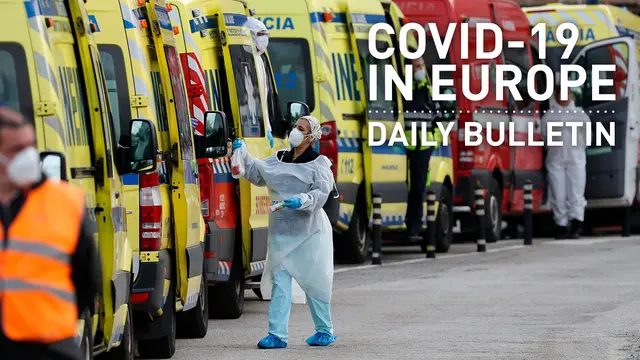TOP HEADLINES
-
Belgium's government has announced it is to ban all non-essential journeys in and out of the country from Wednesday until at least March 1 as it seeks to slow the spread of the virus.
-
Denmark is to temporarily suspend flights from the UAE for five days amid fears over the reliability of COVID-19 tests that can be obtained before leaving Dubai.
-
**High schools in Greece will reopen from February 1, **but the remainder of the nationwide lockdown measures will remain in place, the country's education minister Niki Kerameus said.
-
The British Medical Association has written to the UK government's chief medical officer, Chris Whitty, calling for the gap between the first and second dose of the Pfizer vaccine to be shortened from 12 weeks to six weeks.
-
**Ambulances carrying COVID-19 patients queued outside Portugal's hospital emergency departments on Friday **as the country struggles to cope with a surge of the virus.
-
Norway's capital, Oslo, along with nine neighboring municipalities are to close shopping centers and non-essential shops from noon on Saturday, amid an outbreak of the variant first discovered in the UK.
-
**UK Prime Minister Boris Johnson has warned that the new variant first discovered in the country **
may be 30 percent more deadly than the original strain.
-
Germany has recorded a further 16,417 new cases in the past 24 hours , while fatalities rose by 879 to bring the cumulative death toll to 51,521.
-
Portugal has reported its first case of the variant first discovered in South Africa, the National Health Institute's Ricardo Jorge said.
-
Pharmaceutical firm and vaccine producer, **Pfizer has said it will provide up to 40m doses of its jab **to the WHO's COVAX vaccine program, which is designed to help poorer countries get access to vaccines.

CLICK:
FARMERS WARN AGAINST REINTRODUCING PREDATOR AFTER 500 YEARS
ACROSS EUROPE
Guy Henderson in London
No easing of the UK's lockdown was in sight after Friday evening's British government press conference.
Prime Minister Boris Johnson announced that the new more contagious variant of the coronavirus that emerged in the South East region of England late last year may also be 30 percent more deadly.
There is hope that the number of new cases has peaked, and that hospitalizations may be leveling off. But due to a lag time, it will still be some time before new intensive care admissions come down. The weeks ahead will still see many thousands more deaths.
In the eye of the intensifying storm, the British Medical Association is now questioning the planned route out.
In a letter seen by the BBC, the body calls for a shorter gap between doses of the Pfizer/BioNTech vaccine. Pfizer itself has warned against the UK's approach. Chief Medical Officer Chris Witty continues to defend this strategy, arguing that even a slightly reduced efficacy amongst many people is better than a higher one amongst a few.
Nursing groups are placing pressure on the government too. They want better Personal Protective Equipment (PPE) for all staff in light of the latest data on the new variant.
Government scientists are still more worried about new variants coming in from abroad. On Monday, cabinet ministers will discuss further bolstering border measures, including the option of all new arrivals being obliged to quarantine in hotels.

Ambulances carrying COVID-19 patients queued outside Portugal's hospital emergency departments on Friday as the country struggles to cope with a surge of the virus. /AP
Stefan de Vries in Amsterdam
The ban on passenger flights from the UK, South Africa and all of South America to The Netherlands will come into effect on Saturday. Travelers from other regions have to show a negative test result.
They must have this test done up to four hours before departure, in addition to the mandatory PCR test. This obligation does not apply to travellers from the Caribbean part of the Netherlands and several safe countries, including China, Australia and Japan.
Saturday night will also be the first time The Netherlands will be under curfew. From 9 p.m. to 4.30 a.m. until at least February 9.
There were 5,791 positive tests on Friday, more than the average for the past seven days (5,318). After a two-day drop, the number of admitted coronavirus patients in the Netherlands rose slightly by 14 (to 2,354 patients).
Belgium
Belgium's government has announced it will ban all non-essential overseas travel to and from the country from Wednesday until March 1 in a bid to contain the virus.
The ban will apply to land, sea and air travel but will not affect cross-border workers or those with overriding health or family reasons.
Prime Minister Alexander De Croo said "we are not going to build a wall aroundBelgium. We can go to other countries but only for essential reasons."
"When people travel, the virus travels with them," De Croo added.
Any visitors from the UK, South Africa and South America, where new variants of the virus have been first discovered, will have to quarantine for ten days on arrival as a precaution.
FROM OUR GLOBAL COLLEAGUES
**CGTN Europe special: **
The Alps - Timeless and changing
CGTN China:
Chinese mainland reports 107 new COVID-19 cases
CGTN America:
Biden warns COVID-19 toll could cross 600,000, urges to pass rescue plan
CGTN Africa:
Africa struggles during COVID-19 second wave
Sign up
here
to get the COVID-19 Europe bulletin sent directly to your inbox.
CGTN Europe has been providing in-depth coverage of the novel coronavirus story as it has unfolded.
Here
you can read the essential information about the crisis.
 简体中文
简体中文

